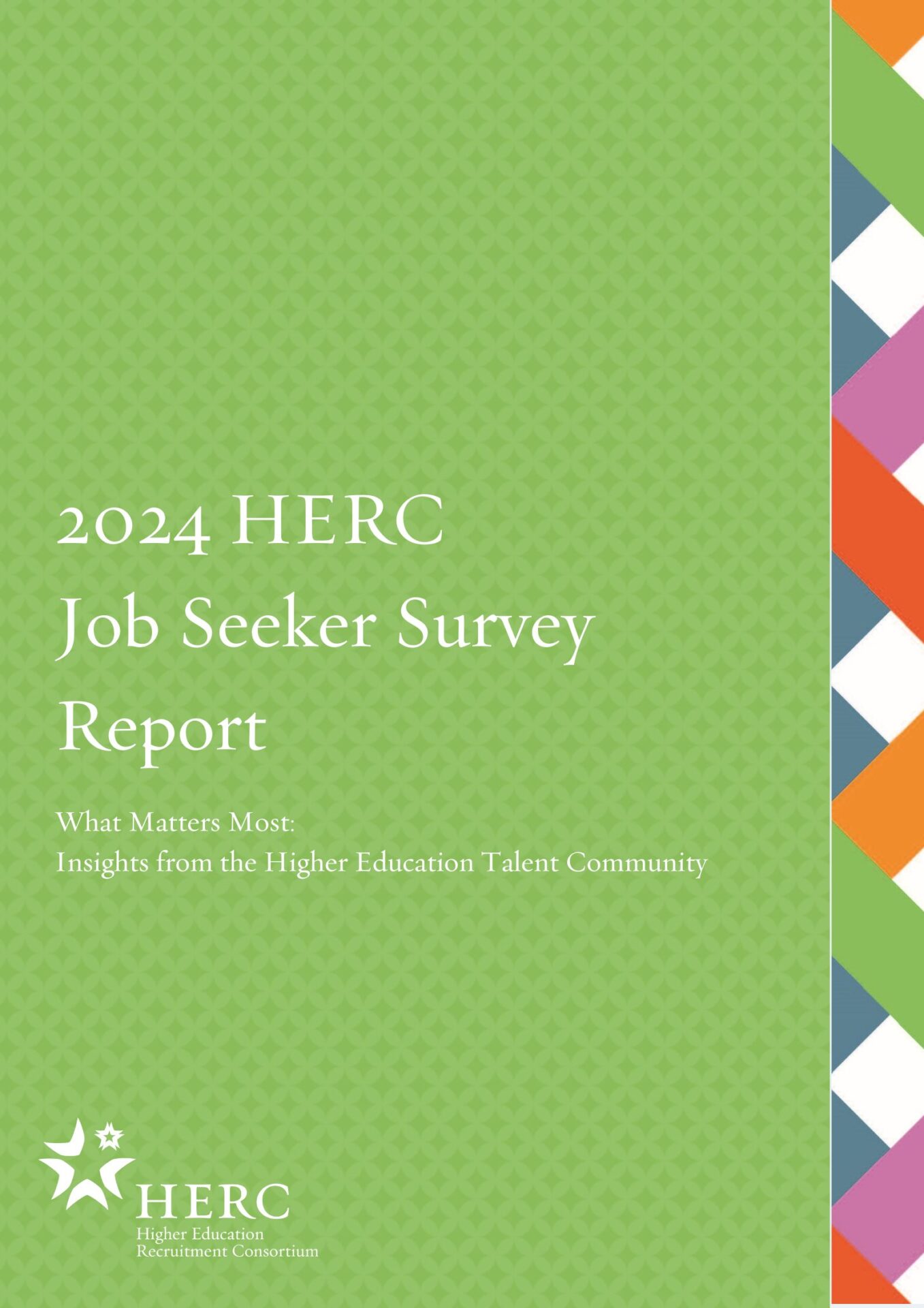Higher Ed Job Seekers Want to Feel Valued, Work-Life Balance, Inclusive Workplace
New Report Reveals Key Priorities – Higher Ed Employers Need to Address Aging Workforce and Rising Competition from Non-Higher Ed Sectors
SAN FRANCISCO, CA – As higher education employers continue to assess the impact of recent media attention on higher education, limited budgets, and competition from external employers, a new report from the Higher Education Recruitment Consortium (HERC) provides timely insights into the higher education talent community, including what benefits are most attractive and the impact of campus culture on job interests. [The full report is available to HERC members. If you are interested in accessing the report, please contact Marcia Silva – see info at the bottom.]
The new publication, “2024 HERC Job Seeker Survey Report: What Matters Most – Insights from the Higher Education Talent Community,” shares key takeaways and recommended actions for human resources, academic affairs, and diversity leaders to improve their efforts to find, select, and retain staff and faculty.
The report strongly encourages higher ed employers to pay attention to what job seekers across different stages in their careers want, including pathways for career advancement When looking for a new employer, job seekers place high importance on the ability to advance their careers internally, with 51% stating that it’s very important and 34% stating that it’s somewhat important. These numbers shift significantly when we analyze responses by race/ethnicity, with 63% of Hispanic/Latine(x)(o)(a)/Spanish job seekers, 66% of Black/African-American job seekers, and 72% of Asian job seekers stating that internal career advancement is very important.
“These findings underscore how policy and other structural decisions impact workforce inclusion efforts,” said Jessica Wise, HERC Co-Executive Director. “For instance, we saw a marked difference between the importance of elder care and access to mental health care for specific demographics.”
Job seekers also want employers to recognize the value of current employees – while nearly 75% of job seekers say that improved compensation and benefits could tempt them to seek new employment, only 5% say that there’s nothing their current employer could do to make their role enjoyable.
Other highlights from the report findings include:
- The active job seeker market has shifted from the trends seen in previous years. The number of respondents who are actively seeking a new job has fallen from 47% in both 2022 and 2023 to 40% in 2024, while those who are open to the right opportunity has continued to slowly but steadily increase, moving from 38% in 2022 to 42% in 2024
- When asked to describe their current job search, 9% of respondents indicated that they are exclusively looking for jobs outside of higher ed and 41% indicated they are looking for jobs in many industries, emphasizing competition from other employers as well as an opportunity to better retain the current workforce.
- The year-over-year data shows that while work modalities are still shifting, the landscape continues to look very different from the norms prior to the pandemic. While in-person work hasn’t changed much, job seekers with flexible/hybrid work modalities have increased from 14% in 2023 to 19% in 2024. With 38% of respondents in remote or flexible roles and the demand for more such opportunities, this is an area of the workforce landscape that seems unlikely to revert to pre-pandemic norms.
The rise in restrictive legislation hasn’t weakened job seekers’ emphasis on potential employers’ policies regarding diversity, equity, and inclusion – 77% of respondents say that DEI policies are very or somewhat important when searching for employment.
“Higher ed employers must develop holistic policies and programs that attract and retain a diverse workforce,” said Wise. “Job seekers continue to place high importance on inclusive workplaces where they are valued, can grow their careers, and thrive as individuals and contributors.”
ABOUT THE HIGHER EDUCATION RECRUITMENT CONSORTIUM: The Higher Education Recruitment Consortium (HERC) is a nonprofit consortium committed to advancing diversity, equity, and inclusion in the higher education workforce. With over 550 colleges, universities, hospitals, research labs, government agencies, and related organizations, HERC works to ensure member institutions are sites of belonging, where all faculty and staff can thrive. HERC provides resources, networking, and outreach programs to attract, hire, and retain a diverse and qualified workforce.
CONTACT: Marcia Silva, Higher Education Recruitment Consortium, marcia@hercjobs.org, 650-417-3193

